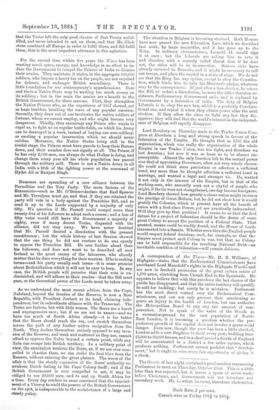For the second time within five years the Times has
been wasting much space, energy, and knowledge in an effort to in- -duce the Government to compel the Princes of India to dismiss their armies. They maintain, it states, in the aggregate 349,000 soldiers, who impose a heavy tax on the people, are not required for defence, and endanger British ascendancy. There is little foundation for our contemporary's apprehensions. Here and there a Native State may be wasting too much money on its soldiery ; but in the main the armies are a benefit to the British Government, for three reasons. First, they strengthen the Native Princes who, as the experience of 1857 showed, act as huge boulders breaking the wave of any popular emotion. Secondly, they draw out of our territories the native soldiers of fortune, whom we cannot employ, and who might become very -dangerous. Thirdly, they encourage any Prince who wants to expel us, to fight us on regular battle-fields, on which his Army can be destroyed in a week, instead of buying our own soldiery, -or exciting a popular insurrection which we should never subdue. Moreover, the Native States being still in the feudal stage, the Princes must have guards to keep their Barons down, and their number does not signify at all. The Prince, if he has only 2,000 men, can always do what Holkar is doing, and change them every year till his whole population has passed through the military mill. There is not a Native Army in all India with a fifth of the fighting power at the command of Ryder All or Runjeet Singh.


































 Previous page
Previous page